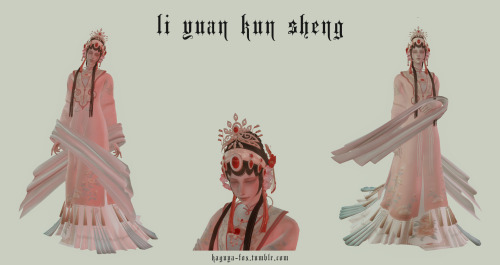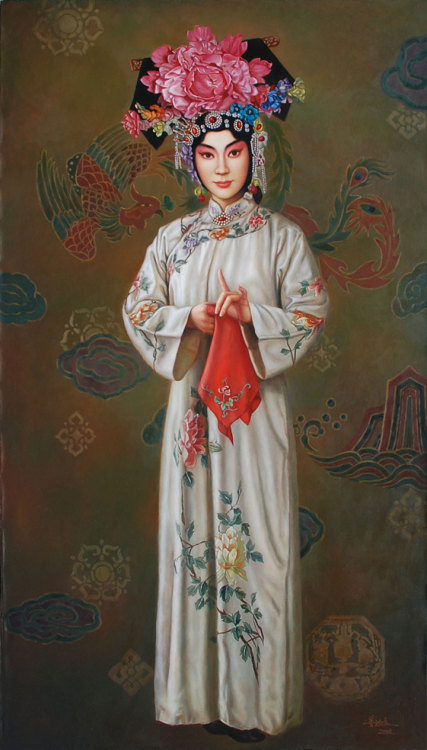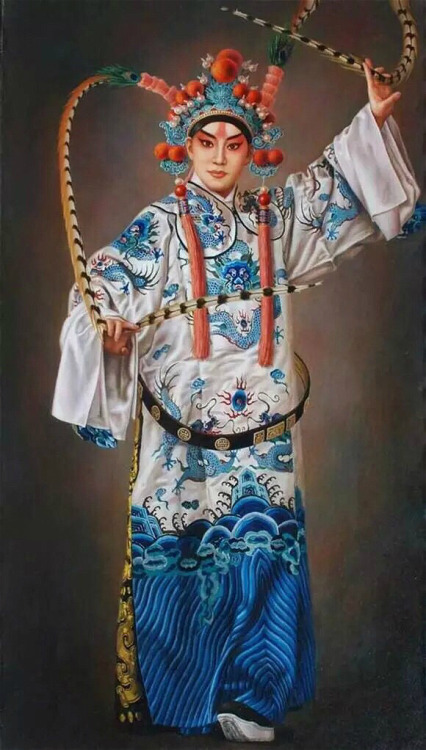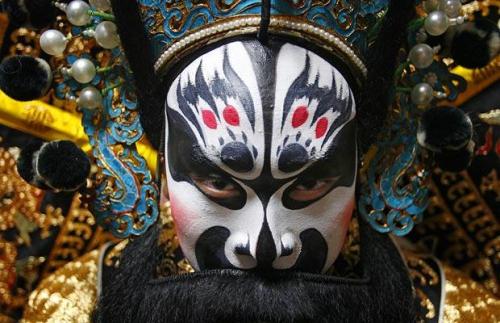#jingju
THREE KINGDOMS IN PEKING OPERA (京剧jingju)
Left to right: Zhang Fei; Guan Yu; Liu Bei; Cao Cao; chibi figurines of the Three Brothers; figurines of the face masks of the Five Tiger Generals
Many scenes in Romance of the Three Kingdoms are folk legends passed down through generations and until today are famous in many story-telling mediums in China: books, TV shows, movies, films. In traditional operas, stories from ROTK are a staple in the repertoire, and this is not an exception in Peking Opera, which derives its influence (and many of its repertoires) from a variety of other earlier opera forms.
The most striking and memorable thing about Peking Opera is probably the face masks actors use to distinguish their characters, of which there are hundreds, or even thousands of. Someone versed in Peking Opera would know by sight which character is which just from the face mask; even if one wouldn’t be able to remember which character it is, from the colors and patterns on the mask one would be able to tell the characteristicsof the character (evil, courageous, a clown, etc).
IlovePeking Opera because of how beautifulit is.It’s an extremely simple but breathtaking form of storytelling—look at how elaborate the costumes and the masks (which the actors/es do on themselves) are! Because of the lack of props, they have to improvise either with the simplest of devices or even with nothing, using simply their body languages and movement to create just about anything (like sewing, fighting, etc) out of thin air. It’s a most dramatic form of drama—even when they aren’t singing, their spoken words are rhythmic and melodic, the intonations of the Chinese characters stressed and exaggerated for so many different kinds of effects. To be a good jingju (not just Peking opera, actually, but any other Chinese opera) actor/es, you have to be well versed in acting, singing, dancing, martial arts and acrobatics. It’s a real demanding job. In China, these actors are respected when they show up in TVs or movies because you can be sure they can act (as opposed to today’s flood of pretty faces on TV who are otherwise wooden in their acting).
If you’re a Three Kingdoms fan and you’re interested in giving jingjua try, here are a few links! If you don’t understand Mandarin Chinese it’s probably hard to follow (actually, even for mainland Chinese it’s really hard to follow unless you memorize the lines) but if you are familiar with the story it’d be okay!
Most famously, this is chibi where Liu Bei and Sun Quan formed an alliance to fight off Cao Cao. This is changbanpo where Zhao Yun fought off Cao Cao’s million men to save Ah Dou. This is dingjunshan where the old general Huang Zhong fought Xiahou Yuan. The chibivideo is a modern-style Peking Opera—to cater to today’s tastes, many aspects—the music is the most obvious part (traditional Peking Opera is ‘noisy’ with many cymbals and the wailing erhu but modern operas have more modern and more ‘melodious’ musical arrangements) while the changbanpo,if I’m not wrong, is filmed in the 60’s so you can see the stark differences in props and effects and music!
(If you ask me, I much prefer this version of chibithan the John Woo movies, of which I have Strong Feelings—mostly Against. But this isn’t the point of the post so never mind!)
And on a totally different note, the chibi jingjufigurines are widely available in Beijing (and even in Shanghai, although when I checked the prices there they’re much higher). I got three of Zilong, Yide and Yunchang for a total of 100 RMB (the salesman was cursing and grumbling as he handed me the products reluctanty) and I regret not getting more (like the entire Five Tiger Generals plus Kongming and Xuande). I think they’re available online too and if you’re interested, check the last image source below (bolded)!
Post link















